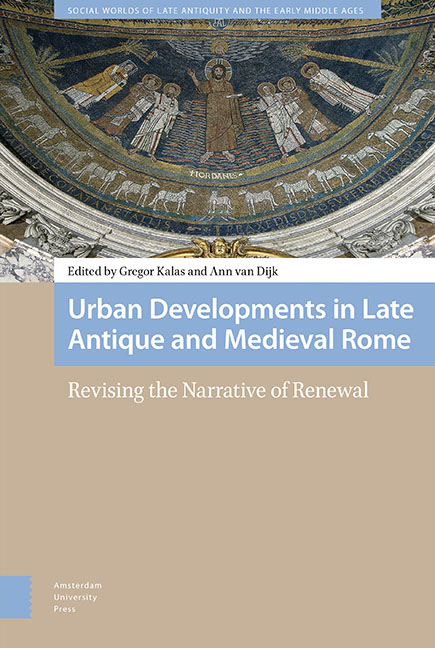Book contents
- Frontmatter
- Contents
- Preface and Acknowledgments
- List of Abbreviations
- 1 Introduction: Revising the Narrative of Renewal for Late Antique and Medieval Rome
- 2 Rome at War: The Effects of Crisis on Church and Community in Late Antiquity
- 3 Portraits of Poets and the Lecture Halls in the Forum of Trajan : Masking Cultural Tensions in Late Antique Rome
- 4 Rolling Out the Red Carpet, Roman-Style : The Arrival at Rome From Constantine to Charlemagne
- 5 (Re-)Founding Christian Rome: The Honorian Project of the Early Seventh Century
- 6 After Antiquity: Renewing the Past or Celebrating the Present? Early Medieval Apse Mosaics in Rome
- 7 The Re-Invention of Rome in the Early Middle Ages
- 8 Rewriting the Renouveau
- 9 Renewal, Heritage, and Exchange in Eleventh-Century Roman Chant Traditions
- 10 Reforming Readers, Reforming Texts: The Making of Discursive Community in Gregorian Rome
- Manuscripts Cited
- Index
3 - Portraits of Poets and the Lecture Halls in the Forum of Trajan : Masking Cultural Tensions in Late Antique Rome
Published online by Cambridge University Press: 18 June 2021
- Frontmatter
- Contents
- Preface and Acknowledgments
- List of Abbreviations
- 1 Introduction: Revising the Narrative of Renewal for Late Antique and Medieval Rome
- 2 Rome at War: The Effects of Crisis on Church and Community in Late Antiquity
- 3 Portraits of Poets and the Lecture Halls in the Forum of Trajan : Masking Cultural Tensions in Late Antique Rome
- 4 Rolling Out the Red Carpet, Roman-Style : The Arrival at Rome From Constantine to Charlemagne
- 5 (Re-)Founding Christian Rome: The Honorian Project of the Early Seventh Century
- 6 After Antiquity: Renewing the Past or Celebrating the Present? Early Medieval Apse Mosaics in Rome
- 7 The Re-Invention of Rome in the Early Middle Ages
- 8 Rewriting the Renouveau
- 9 Renewal, Heritage, and Exchange in Eleventh-Century Roman Chant Traditions
- 10 Reforming Readers, Reforming Texts: The Making of Discursive Community in Gregorian Rome
- Manuscripts Cited
- Index
Summary
Abstract
The Forum of Trajan featured late antique statues of the poets Claudian, Flavius Merobaudes, Sidonius Apollinaris, and probably others in an outdoor exhibition honoring those authors whose works eased harsh political rivalries. This essay considers the statues as displayed in close proximity to the sculptural reliefs on the Column of Trajan. Its visual narratives depicting military campaigns in Dacia corresponded to Claudian's descriptions of battles, Merobaudes's narratives of war, and Sidonius's tales of military prowess. The chapter also analyzes the performance venues in Trajan’s Forum, built during the reign of Hadrian, where poets performed before elite audiences. The portraits communicated messages in keeping with the poets’ verses, which upheld the long-lasting image of Rome's resilience.
Keywords: panegyrics, portrait statues; late antique Rome; late antique poetry; Forum of Trajan.
Enthusiasm for the muses and devotion to my poetic craft also disturb the silence at night. For I saw myself as if in the star-studded city of the heavens, producing verses at the feet of Jupiter. And in order to sustain this dream, the gods applauded what I spoke and a sacred crowd surrounded me in the sanctuary […]. Sleep can create nothing greater; and this lofty hall has shown the poet an assembly that is comparable to the heavenly gathering. The preface of the final poetic panegyric composed by Claudian (active c. 394–c. 404) at the turn of the fifth century features the author's daydream of performing before the gods. Imagining himself in a splendid, tall auditorium, Claudian invites readers to compare a fictional hall for deities with an actual performance space where poets read their works before audiences. This dream about a gathering of the gods is a commonplace from epic poetry in which Jupiter commands a celestial assembly, here used to advance the author's main agenda of praising the emperor Honorius and his earthly court. Claudian inspired subsequent generations of poets to produce works about the ruling emperors and the military elite; I draw particular attention here to the authors Flavius Merobaudes (active c. 432–c. 460) and Sidonius Apollinaris (d. 489) who deployed the same epic tropes as Claudian. The verses by Claudian also offer tantalizing details about the real conditions in which poets presented their verse panegyrics before live audiences in Rome.
- Type
- Chapter
- Information
- Urban Developments in Late Antique and Medieval RomeRevising the Narrative of Renewal, pp. 75 - 108Publisher: Amsterdam University PressPrint publication year: 2021

